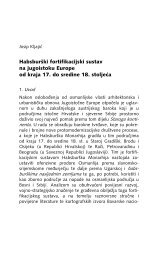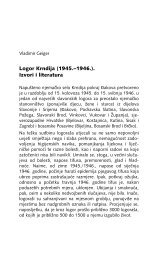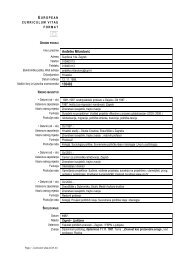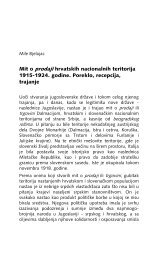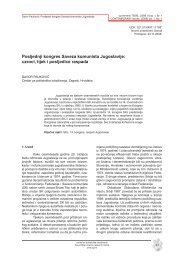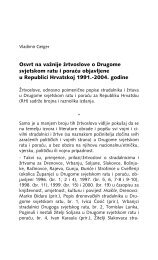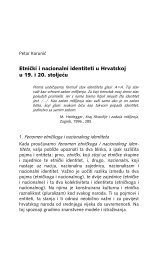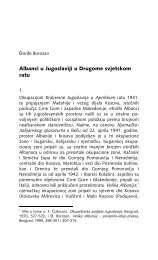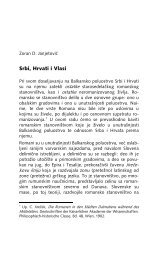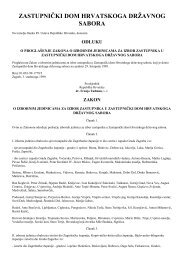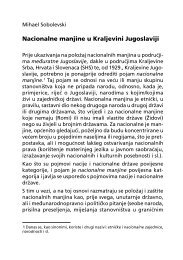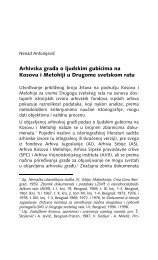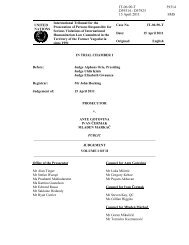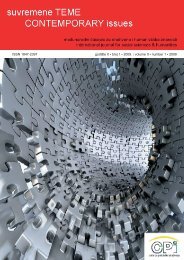Igor Graovac - Centar za politološka istraživanja
Igor Graovac - Centar za politološka istraživanja
Igor Graovac - Centar za politološka istraživanja
Create successful ePaper yourself
Turn your PDF publications into a flip-book with our unique Google optimized e-Paper software.
Ivo Goldstein 139<br />
man. A kada je ustašonostalgija uzela maha, vlast je postala nedopustivo<br />
tolerantna i prema ustašoidnim ekscesima. Ipak, Hrvatska je u<br />
ratu 1991.-1995. bila žrtva i hrvatska se historiografija, stoga, opredijelila<br />
<strong>za</strong> žrtvu. Unatoč tome, na istom su se poslu našli i hrvatski i<br />
srpski [te srbijanski] ekstremisti, i ta političko-zločinačka koalicija već<br />
duže vrijeme funkcionira izvrsno. A ona je opasna jer razvija daljnju<br />
mistifikaciju (primjerice obje strane o Jasenovcu), koja pomirenju ne<br />
daje nikakve izglede. Stoga mi, historičari, možemo i moramo raditi<br />
ako ne na političkom, a ono na historiografskome pomirenju, i to bez<br />
političkih pritisaka. Posvadili smo se i <strong>za</strong>ratili preko povijesti. Možemo<br />
li se preko nje i miriti? Ne treba imati iluzija, ali valja potaknuti<br />
otvaranje.<br />
Summary<br />
Reconciliation is an intellectual process, which can be somewhat<br />
helped by economic and other contacts, but still needs to be worked<br />
out by intellectuals in a totally free discussion. Where does historical<br />
science in Croatia and Serbia stand in that respect, and what burdens<br />
the knowledge on history in those areas? In Serbia, it is burdened with<br />
mystifications, the cult of sacrifice and an obsession with the past, and<br />
ever since 1987, this newly concocted history has also had a completely<br />
war-instigating purpose. Such obsession with the national in<br />
history has been driven to the absurd, to historical hysteria and a total<br />
disregard of the historical facts. And how did the Croatian historiography<br />
do in such a situation? It did not hurry up with writing a new<br />
history, but still, quite a number of researchers did race to re-value the<br />
recent and older Croatian history - Franjo Tudjman most of all. And<br />
when the nostalgia for the Ustasha spread, the authorities became<br />
impermissibly tolerant to Ustasha-related excesses, as well. Still,<br />
Croatia was the victim in the war from 1991 to 1995, so Croatian<br />
historiography took the side of the victim. Despite that, both Croatian<br />
and Serbian extremists found themselves doing the same thing and<br />
this political-criminal coalition has been functioning great for a long<br />
time already. And it is dangerous, because it develops further mystification<br />
(for example, both sides on the Jasenovac camp), which does<br />
not give reconciliation any chance. This is why we, historians, can and<br />
must work towards historiographic reconciliation, if not political, and it<br />
has to be done without political pressure. We started arguing and



